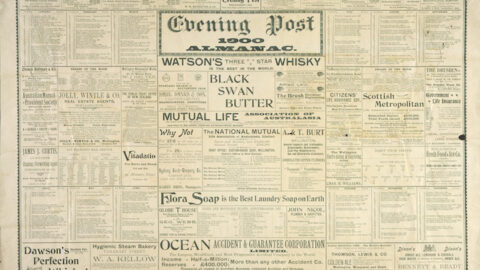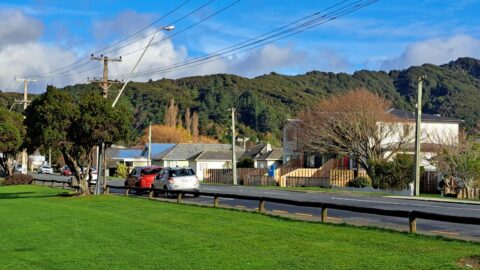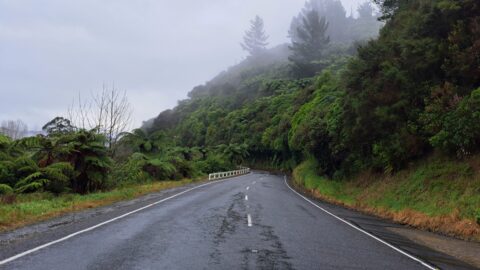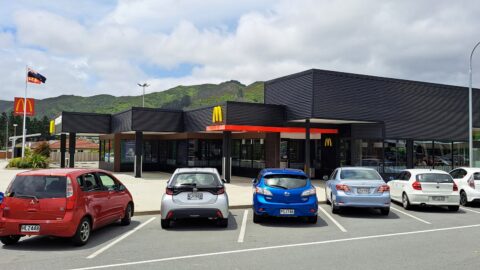Water Supply Extension – Messrs Clark and Baird’s Expedition
Mr Clark, C.E., and the City Engineer, Mr Baird, returned from Wainui-o-mata last night. The result of their expedition is considered the most satisfactory of any yet attained in the direction of obtaining an extended water supply for this city. The volume of the stream is found to be ample for all purposes, in fact it would afford an abundant supply of water to the city of London itself. The minimum flow is roughly estimated at from 40 to 50 millions of gallons per diem, while during the rainy seasons this is more than doubled. Hence the quantity is all that could be desired, and the quality is unexceptionable as to purity.
Moreover, as we mentioned previously, the watershed is Crown land, and thus obtainable on reasonable terms, although at the point from which the water would be taken the river runs through private property – that of Mr Sinclair, from whose mill it is distant about a mile and a half. The altitude, as roughly calculated by barometer, was apparently about 450ft., but the corrections rendered necessary on comparison with the fixed barometers in town, owing to the fluctuations in the atmospheric pressure yesterday, reduce this by almost 150ft, leaving the approximate elevation about 300ft. This, however, would be quite sufficient for the purpose, and it is considered worth while now to ascertain the exact altitude by leveling, which will be done as soon as possible.
The works which would be required to bring the water from this source into town, although necessarily representing in the aggregate a rather formidable sum, would not be of an expensive nature, comparatively speaking. At the point from which the water would be taken the stream is about 40ft wide. A weir of simple construction and about 20ft high in all would suffice. The sides of the stream course are perpendicular rocky walls about 45ft in height, thus the natural features are eminently adaptable to the construction of a basin at small cost.
The next work would be a short tunnel about 15 or 20 chains in length through a high spur which extends in a south-easterly direction from the main range, and to go round which, with iron pipes, would be both costly and inconvenient as causing a loss of “head.” After passing through this tunnel and crossing over an intervening valley, either by an open aqueduct or in 24in pipes, a second similar spur will have to be passed through by another short tunnel of about the same length as the first. The Wainui-o-mata Flat then would be reached, and, until the exact level of that locality is ascertained, it is uncertain how it would have to be crossed, whether by iron pipes, aqueduct, or flume.
Next comes the heaviest work on the whole line, the tunnel through the main range to the Hutt Valley. This tunnel would be about 40 chains long, and would cost probably from £6000 to £7000. Emerging from the tunnel, the water next would enter a series of cast-iron pipes, 2ft in diameter, by which it would be conveyed all the remainder of the distance into town. After passing over a tract of level ground, including the racecourse, the Hutt River would have to be crossed near its mouth by an aqueduct of some description. If the proposed branch railway from Petoni to the racecourse should be carried out, the waterpipes could pass over the railway bridge, and then continue along the branch railway to its junction with the main line. In any case, however, the water would be carried from the mouth of the tunnel in as direct a course as possible to the railway at Petoni, and thence along the line into town. The total distance is estimated at about 15 miles.
Of the cost only a very rough general approximate estimate of course can be formed at present. Taking the necessary works from the time the water leaves the stream, there would be somewhere about a mile of tunneling and about 14 miles of 24-inch iron pipes. The cost of the tunneling would depend to a great extent on the nature of the material to be cut through, the size, shape, &c. Mr Clark estimated the cost of the main drainage tunnel, a mile and a quarter in length, at £22,000, but the water tunnel would not need to be so large or so expensively constructed, and it is possible that the mile of tunneling might be done for £10,000 or £12,000. The pipes of cast iron, 24 inches in diameter, and the work of laying them, would cost about £6000 per mile, or taking the length of pipes at 14 miles, about £84,000 in all, to which if £10,000 be added as the cost of the tunnels, the total sum required would be about £94,000, exclusive of the cost of the weir, and of the land at the stream, which it is thought might be brought within £6000. In that case the total cost of the work, by which an ample supply for several generations would be provided, might be set down in round numbers at £100,000.
Tags: Newspaper Pipeline Sinclair Tunnels Waterworks




